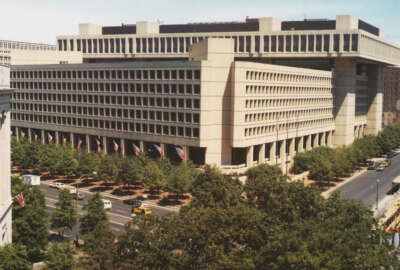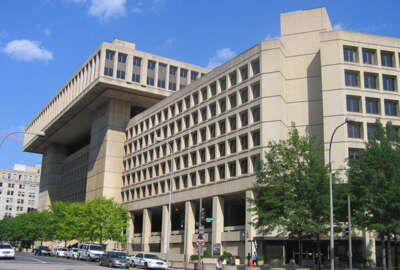
Connolly asks GSA IG to investigate FBI headquarters decision
Rep. Gerry Connolly sends letter to GSA's inspector general to look into why agency officials abandoned plans to consolidate the FBI under one roof.
A leading Democrat on the House Oversight and Government Reform Committee is calling on the General Services Administration’s inspector general to investigate the agency’s sudden reversal on plans for the FBI headquarters building.
In a letter Wednesday, Rep. Gerry Connolly (D-Va.), the ranking member of the subcommittee on government operations, asked GSA’s inspector general to look into why agency officials earlier this month abandoned plans to consolidate the FBI under one roof in suburban Maryland or Virginia.
Instead, GSA intends to tear down the crumbling J. Edgar Hoover building in downtown Washington, D.C. and build a modern headquarters in its place.
Connolly requested an IG investigation after he said he received insufficient explanations from GSA Administrator Emily Murphy and Public Buildings Service Commissioner Dan Mathews during a subcommittee hearing last week.
“GSA’s top officials were unable to justify their sudden decision to abandon years of detailed planning, and they provided insufficient information about the factors on which they based this decision,” Connolly wrote.
Connolly asked the IG to look specifically into how GSA arrived at its decision to keep the FBI headquarters in downtown Washington, D.C. and whether the decision fully accounts for short-term and long-term cost-effectiveness and security concerns.
Robert Preiss, a spokesman for GSA’s Office of the Inspector General, told Federal News Radio that the inspector general has received Connolly’s letter and “will be giving it full consideration.”
Senators not seeing value in new headquarters plan
The House lawmaker sent the letter after senators expressed concerns about the new FBI headquarters plan at a hearing Wednesday.
The new headquarters plan proposed by the FBI and GSA would accommodate only about 8,300 FBI employees, a decrease from the 10,600 FBI employees that would have worked out of a consolidated suburban campus in Maryland or Virginia.
Under the new plan, the remaining 2,300 employees would be relocated to FBI facilities in Idaho, West Virginia and Alabama.
Tom Carper (D-Del.), the Senate Environment and Public Works Committee’s ranking member, said the consolidated campus plan addressed the FBI’s concerns about the security of its current location, and reduced departmental fragmentation.
“This new plan, however, appears to do just the opposite. And instead of moving common tasks closer together, this report recommends moving approximately 20 percent of the current headquarters staff to locations around the country,” Carper said.
Mathews told senators GSA reversed course on the FBI headquarters plan after expressing doubts its cash-and-land deal would work out as intended.
“The legal and operational risks were simply too great with that type of a structure of the procurement to proceed without full funding in hand,” Mathews said.
Before the Trump administration canceled the consolidated campus idea in July 2017, GSA originally planned to award appropriated funds and the FBI’s downtown D.C. real estate to the contractor selected to build a new suburban headquarters in Springfield, Virginia; Landover, Maryland; or Greenbelt, Maryland.
“Without full funding of the appropriated portion of the project — meaning the delta between the estimated value of the Hoover building and the actual cost of the facility — that new facility could not have been completed. The FBI would have been unable to move, to relocate out of the Hoover building, and the current site could not have been turned over in accordance with the contract,” Mathews said.
Sen. Ben Cardin (D-Md.) pushed back on Mathews’ rationale, saying the cash-and-land deal was GSA’s idea in the first place.
“Congress didn’t like that idea, but you said it was something you needed to do to get it done. So now we’re supposed to believe that’s the reason why you terminated it — for something that you wanted,” Cardin said.
Mathews, who took over as PBS commissioner in August, said GSA’s cash-and-land deal under the Obama administration was “a mistake.”
Sen. John Barrasso (R-Wyo.), the committee chairman, expressed concerns the new FBI headquarters plan lacks security features — including a remote truck inspection facility — that the agency had previously requested.
“Under the old plan, these features were considered critical for FBI’s security — now they’re gone,” Barrasso said.
Richard Haley, the assistant director of the FBI’s Finance Division, said the new headquarters would still meet security requirements.
“We looked at what the status quo is now, and it’s unacceptable, and we believe we’re still maintaining an appropriate security posture. What we give up in space obviously needs to be made up for in thickness of concrete and other security ways of getting to those same type of assurances, that we’re meeting that requirement,” Haley said.
Haley added that moving thousands of FBI employees to agency facilities in Idaho, West Virginia and Alabama would “enhance our resiliency and operational effectiveness.”
Sen. Shelley Moore Capito (R-W.V.) said under the new plan, hundreds of jobs would be relocated from the D.C. metro region to the FBI’s Biometric Center of Excellence in Clarksburg, West Virginia.
“That would be an important development for me, obviously, as that facility continues to grow and become more professional, more highly technological, and we would welcome that prospect of having those employees move out into West Virginia,” Capito said.
Is the new FBI plan more cost-effective?
Senators also pressed for more details about the full cost of the new headquarters plan. GSA estimates the total cost of the project would be $3.3 billion — $1.9 billion of which would be construction costs.
In particular, senators requested more details about the projected cost of “swing space,” temporary offices for FBI employees to work out of during the construction of a new headquarters.
Mathews said the briefing GSA gave lawmakers about the new headquarters left out the cost of renting temporary offices because it would roughly break even with the costs of no longer maintaining the J. Edgar Hoover building. However, he added that it would cost about $427 million to outfit the temporary offices with necessary security features.
“There’s considerable expenses to operate and maintain the Hoover building, and those are roughly equivalent to the rental of space costs for swing space. We left those out because they’re basically on both sides of the ledger no matter what we’re doing and they cancel themselves out,” Mathews said.
Haley said the FBI has been working with GSA and the intelligence community to find vacant office space the agency could temporarily relocate employees. All things considered, he said the new headquarters plan comes close to the cost of the old consolidation plan.
“We believe that the two costs, the previous plan and this plan, are similar in cost. There’s ups and downs on both of them. But we would not be coming here honestly if this was significantly more expensive, even with the swing space and that requirement,” Haley said.
Sen. Chris Van Hollen (D-Md.) expressed disappointment in the new plan, considering the federal government has already spent $20 million over more than 12 years to try and consolidate the FBI’s headquarters.
“This is a textbook example of how the federal government should not operate over a period of time. It is an example that people will use for decades to come about how the federal government misled people from start to finish, failed to provide information to the Congress when requested and constantly changed its assessment of what was required for the FBI,” Van Hollen said.
Despite several lines of questioning from Cardin and Van Hollen, Mathews and Haley declined to say directly whether the White House or President Donald Trump played a role in the new direction for the FBI headquarters.
“My answer is I’m not in a position to answer that question,” Haley said, adding that the new headquarters plan was an FBI decision.
“The way that you’re answering, it simply encourages suspicion,” said Carper said.
Copyright © 2024 Federal News Network. All rights reserved. This website is not intended for users located within the European Economic Area.
Jory Heckman is a reporter at Federal News Network covering U.S. Postal Service, IRS, big data and technology issues.
Follow @jheckmanWFED





